- Home
- Alice Munro
Selected Stories Page 5
Selected Stories Read online
Page 5
It is while I am at the piano, playing the minuet from Berenice, that the final arrival, unlooked-for by anybody but Miss Marsalles, takes place. It must seem at first that there has been some mistake. Out of the corner of my eye I see a whole procession of children, eight or ten in all, with a redhaired woman in something like a uniform, mounting the front step. They look like a group of children from a private school on an excursion of some kind (there is that drabness and sameness about their clothes) but their progress is too scrambling and disorderly for that. Or this is the impression I have; I cannot really look. Is it the wrong house, are they really on their way to the doctor for shots, or to Vacation Bible Classes? No, Miss Marsalles has got up with a happy whisper of apology; she has gone to meet them. Behind my back there is a sound of people squeezing together, of folding chairs being opened, there is an inappropriate, curiously unplaceable giggle.
And above or behind all this cautious flurry of arrival there is a peculiarly concentrated silence. Something has happened, something unforeseen, perhaps something disastrous; you can feel such things behind your back. I go on playing. I fill the first harsh silence with my own particularly dogged and lumpy interpretation of Handel. When I get up off the piano bench I almost fall over some of the new children who are sitting on the floor.
One of them, a boy nine or ten years old, is going to follow me. Miss Marsalles takes his hand and smiles at him and there is no twitch of his hand, no embarrassed movement of her head to disown this smile. How peculiar; and a boy too. He turns his head towards her as he sits down; she speaks to him encouragingly. But my attention has been caught by his profile as he looks up at her—the heavy, unfinished features, the abnormally small and slanting eyes. I look at the children seated on the floor and I see the same profile repeated two or three times; I see another boy with a very large head and fair shaved hair, fine as a baby’s; there are other children whose features are regular and unexceptional, marked only by an infantile openness and calm. The boys are dressed in white shirts and short gray pants and the girls wear dresses of gray-green cotton with red buttons and sashes.
“Sometimes that kind is quite musical,” says Mrs. Clegg.
“Who are they?” my mother whispers, surely not aware of how upset she sounds.
“They’re from that class she has out at the Greenhill School. They’re nice little things and some of them quite musical but of course they’re not all there.”
My mother nods distractedly; she looks around the room and meets the trapped, alerted eyes of the other women, but no decision is reached. There is nothing to be done. These children are going to play. Their playing is no worse—not much worse—than ours, but they seem to go slowly, and then there is nowhere to look. For it is a matter of politeness surely not to look closely at such children, and yet where else can you look during a piano performance but at the performer? There is an atmosphere in the room of some freakish inescapable dream. My mother and the others are almost audible saying to themselves: No, I know it is not right to be repelled by such children and I am not repelled, but nobody told me I was going to come here to listen to a procession of little—little idiots for that’s what they are—WHAT KIND OF A PARTY IS THIS? Their applause, however, has increased, becoming brisk, let-us-at-least-get-this-over-with. But the program shows no signs of being over.
Miss Marsalles says each child’s name as if it were a cause for celebration. Now she says, “Dolores Boyle!” A girl as big as I am, a long-legged, rather thin and plaintive-looking girl with blond, almost white, hair, uncoils herself and gets up off the floor. She sits down on the bench and after shifting around a bit and pushing her long hair back behind her ears she begins to play.
We are accustomed to notice performances at Miss Marsalles’ parties, but it cannot be said that anyone has ever expected music. Yet this time the music establishes itself so effortlessly, with so little demand for attention, that we are hardly even surprised. What she plays is not familiar. It is something fragile, courtly, and gay, that carries with it the freedom of a great unemotional happiness. And all that this girl does—but this is something you would not think could ever be done—is to play it so that this can be felt, all this can be felt, even in Miss Marsalles’ living room on Bala Street on a preposterous afternoon. The children are all quiet, the ones from Greenhill School and the rest. The mothers sit, caught with a look of protest on their faces, a more profound anxiety than before, as if reminded of something that they had forgotten they had forgotten; the white-haired girl sits ungracefully at the piano with her head hanging down, and the music is carried through the open door and the windows to the cindery summer street.
Miss Marsalles sits beside the piano and smiles at everybody in her usual way. Her smile is not triumphant, or modest. She does not look like a magician who is watching people’s faces to see the effect of a rather original revelation—nothing like that. You would think, now that at the very end of her life she has found someone whom she can teach—whom she must teach—to play the piano, she would light up with the importance of this discovery. But it seems that the girl’s playing like this is something she always expected, and she finds it natural and satisfying; people who believe in miracles do not make much fuss when they actually encounter one. Nor does it seem that she regards this girl with any more wonder than the other children from Greenhill School, who love her, or the rest of us, who do not. To her no gift is unexpected, no celebration will come as a surprise.
The girl is finished. The music is in the room and then it is gone and naturally enough no one knows what to say. For the moment she is finished it is plain that she is just the same as before, a girl from Greenhill School. Yet the music was not imaginary. The facts are not to be reconciled. And so after a few minutes the performance begins to seem, in spite of its innocence, like a trick—a very successful and diverting one, of course, but perhaps—how can it be said?—perhaps not altogether in good taste. For the girl’s ability, which is undeniable but after all useless, out of place, is not really something that anybody wants to talk about. To Miss Marsalles such a thing is acceptable, but to other people, people who live in the world, it is not. Never mind, they must say something and so they speak gratefully of the music itself, saying how lovely, what a beautiful piece, what is it called?
“The Dance of the Happy Shades,” says Miss Marsalles. Danse des ombres heureuses, she says, which leaves nobody any the wiser.
BUT THEN driving home, driving out of the hot red-brick streets and out of the city and leaving Miss Marsalles and her no longer possible parties behind, quite certainly forever, why is it that we are unable to say—as we must have expected to say—Poor Miss Marsalles? It is the Dance of the Happy Shades that prevents us, it is that one communiqué from the other country where she lives.
Postcard
YESTERDAY AFTERNOON, yesterday, I was going along the street to the Post Office, thinking how sick I was of snow, sore throats, the whole dragged-out tail end of winter, and I wished I could pack off to Florida, like Clare. It was Wednesday afternoon, my half-day. I work in King’s Department Store, which is nothing but a ready-to-wear and dry goods, in spite of the name, They used to have groceries, but I can just barely recall that. Momma used to take me in and set me on the high stool and old Mr. King would give me a handful of raisins and say, I only give them to the pretty girls. They took the groceries out when he died, old Mr. King, and it isn’t even King’s Department Store anymore, it belongs to somebody named Kruberg. They never come near it themselves, just send Mr. Hawes in for manager. I run the upstairs, Children’s Wear, and put in the Toyland at Christmas. I’ve been there fourteen years and Hawes doesn’t pick on me, knowing I wouldn’t take it if he did.
It being Wednesday the wickets in the Post Office were closed, but I had my key. I unlocked our box and took out the Jubilee paper, in Momma’s name, the phone bill, and a postcard I very nearly missed. I looked at the picture on it first and it showed me palm trees, a hot blue sky, the front
of a motel with a sign out front in the shape of a big husky blond creature, lit up with neon I suppose at night. She was saying Sleep at my place—that is, a balloon with those words in it came out of her mouth. I turned it over and read, I didn’t sleep at her place though it was too expensive. Weather could not be better. Mid-seventies. How is the winter treating you in Jubilee? Not bad I hope. Be a good girl. Clare. The date was ten days back. Well, sometimes postcards are slow, but I bet what happened was he carried this around in his pocket a few days before he remembered to mail it. It was my only card since he left for Florida three weeks ago, and here I was expecting him back in person Friday or Saturday. He made this trip every winter with his sister Porky and her husband, Harold, who lived in Windsor. I had the feeling they didn’t like me, but Clare said it was my imagination. Whenever I had to talk to Porky I would make some mistake like saying something was irrevelant to me when I know the word irrelevant, and she never let on but I thought about it afterwards and burned. Though I know it serves me right for trying to talk the way I never would normally talk in Jubilee. Trying to impress her because she’s a MacQuarrie, after all my lecturing Momma that we’re as good as them.
I used to say to Clare, write me a letter while you’re away, and he would say, what do you want me to write about? So I told him to describe the scenery and the people he met, anything would be a pleasure for me to hear about, since I had never been further away from home than Buffalo, for pleasure (I won’t count that train trip when I took Momma to Winnipeg to see relatives). But Clare said, I can tell you just as well when I get back. He never did, though. When I saw him again I would say, well, tell me all about your trip, and he would say, what do you want me to tell? That just aggravated me, because how would I know?
I saw Momma waiting for me, watching through the little window in the front door. She opened the door when I turned in our walk and called out, “Watch yourself, it’s slippery. The milkman nearly took a header this morning.”
“There’s days when I think I wouldn’t mind breaking a leg,” I said, and she said, “Don’t say things like that, it’s just asking for punishment.”
“Clare sent you a postcard,” I said.
“Oh, he did not!” She turned it over and said, “Addressed to you, just as I thought.” But she was smiling away. “I don’t care for the picture he picked but maybe you don’t get much choice down there.”
Clare was probably a favorite with old ladies from the time he could walk. To them he was still a nice fat boy, so mannerly, not stuck-up in spite of being a MacQuarrie, and with a way of teasing that perked them up and turned them pink. They had a dozen games going, Momma and Clare, that I could never keep up with. One was him knocking at the door and saying something like, “Good-evening, ma’am, I just wondered if I could interest you in a course in body development I’m selling to put myself through college.” And Momma would swallow and put on a stern face and say, “Look here, young man, do I look like I need a course in body development?” Or he would look doleful and say, “Ma’am, I’m here because I’m concerned about your soul.” Momma would roar laughing. “You be concerned about your own,” she said, and fed him chicken dumplings and lemon-meringue pie, all his favorites. He told her jokes at the table I never thought she’d listen to. “Did you hear about this old gentleman married a young wife, and he went to the doctor? Doctor, he says, I’m having a bit of trouble—” “Stop it,” Momma said—but she waited till he was through—“you are just embarrassing Helen Louise.” I have got rid of the Louise on the end of my name everywhere but at home. Clare picked it up from Momma and I told him I didn’t care for it but he went right on. Sometimes I felt like their child, sitting between him and Momma with both of them joking and enjoying their food and telling me I smoked too much and if I didn’t straighten up I’d get permanent round shoulders. Clare was—is—twelve years older than I am and I don’t ever remember him except as a grown-up man.
I USED to see him on the street and he seemed old to me then, at least old the way almost everybody grown-up did. He is one of those people who look older than they are when they’re young and younger than they are when they’re old. He was always around the Queen’s Hotel. Being a MacQuarrie he never had to work too hard and he had a little office and did some work as a Notary Public and a bit of insurance and real estate. He still has the same place, and the front window is always bleary and dusty and there’s a light burning in the back, winter and summer, where a lady about eighty years old, Miss Maitland, does his typing or whatever he gives her to do. If he’s not in the Queen’s Hotel he has one or two of his friends sitting around the space heater doing a little cardplaying, a little quiet drinking, mostly just talking. There’s a certain kind of men in Jubilee and I guess every small town that you might call public men. I don’t mean public figures, important enough to run for Parliament or even for mayor (though Clare could do that if he wanted to be serious), just men who are always around on the main street and you get to know their faces. Clare and those friends of his are like that.
“He down there with his sister?” Momma said, as if I hadn’t told her. A lot of my conversations with Momma are replays. “What is that name they call her?”
“Porky,” I said.
“Yes, I remember thinking, That’s some name for a grown woman. And I remember her being baptized and her name was Isabelle. Way back before I was married, I was still singing in the choir. They had one of those long, fangle-dangle christening robes on her, you know them.” Momma had a soft spot for Clare but not for the MacQuarrie family. She thought they were being stuck-up when they just breathed. I remember a year or two ago, us going past their place, and she said something about being careful not to step on the grass of the Mansion, and I told her, “Momma, in a few years’ time I am going to be living here, this is going to be my house, so you better stop calling it the Mansion in that tone of voice.” She and I both looked up at the house with all its dark green awnings decorated with big white Old English M’s, and all the verandas and the stained-glass window set in the side wall, like in a church. No sign of life, but upstairs old Mrs. MacQuarrie was lying, and is still, paralyzed down one side and not able to speak, Willa Montgomery tending her by day and Clare by night. Strange voices in the house upset her, and every time Clare took me in we could only whisper so she wouldn’t hear me and throw some kind of paralytic fit. After her long look Momma said, “It’s a funny thing but I can’t imagine your name MacQuarrie.”
“I thought you were so fond of Clare.”
“Well I am, but I just think of him coming to get you Saturday night, him coming to dinner Sunday night, I don’t think of you and him married.”
“You wait and see what happens when the old lady passes on.”
“Is that what he told you?”
“It’s understood.”
“Well imagine,” Momma said.
“You don’t need to act like he’s doing me a favor because I can tell you there are plenty of people would consider it the other way round.”
“Can’t I open my mouth without you taking offense?” said Momma mildly.
Clare and I used to slip in the side door on Saturday nights and make coffee and something to eat in the high, old-fashioned kitchen, being as quiet and sneaky about it as two kids after school. Then we’d tiptoe up the back stairs to Clare’s room and turn on the television so she’d think he was by himself, watching that. If she called him I’d lie alone in the big bed watching the program or looking at the old pictures on the wall—him on the high-school hockey team playing goalie, Porky in her graduation outfit, him and Porky and friends I didn’t know on holidays. If she kept him a long time and I got bored I would get downstairs under cover of the television and have more coffee. (I never drank anything stronger, left that to Clare.) With just the kitchen light to see by I’d go into the dining room and pull out the drawers and look at her linen and open the china cabinet and the silver chest and feel like a thief. But I’d think, Why shouldn�
�t I have the enjoyment of this and the name MacQuarrie since I wouldn’t have to do anything I’m not doing anyway? Clare said, “Marry me,” soon after we started going out together and I said, “Don’t bother me, I don’t want to think about getting married,” and he quit. When I brought it up myself, these years later, he seemed pleased. He said, “Well, there’s not many old buffalos like me hear a pretty girl like you say she wants to marry them.” I thought, Wait till I get married and go into King’s Department Store and send Hawes scurrying around waiting on me, the old horse’s neck. Wouldn’t I like to give him a bad time, but I’d restrain myself, out of good taste.
“I’M GOING to take that postcard now and put it in my box,” I said to Momma. “And I can’t think of a better way for us to spend this afternoon than for us both to take naps.” I went upstairs and put on my dressing gown (Chinese-embroidered, and Clare’s present). I creamed my face and got the box I keep postcards and letters and other mementos in, and I put it with the Florida postcards from other years and some from Banff and Jasper and the Grand Canyon and Yellowstone Park. Then just idling away the time I looked at my school pictures and report cards and the program for H.M.S. Pinafore, put on by the high school, in which I was the heroine, what’s-her-name, the captain’s daughter. I remember Clare meeting me on the street and congratulating me on my singing and how pretty I looked and me flirting with him a bit just because he seemed so old and safe and I would as soon flirt as turn around, I was so pleased with myself. Wouldn’t I have been surprised if I had seen all of what was going to happen? I hadn’t even met Ted Forgie then.
I knew his letter just from looking at the outside, and I never read it anymore, but just out of curiosity I opened it up and started off. I usually hate to write a typewritten letter because it lacks the personal touch but I am so worn out tonight with all the unfamiliar pressures here that I hope you will forgive me. Typewritten or not, it used to be that just looking at that letter I would get a feeling of love, if that is what you want to call it, strong enough to pretty near crumple me up and knock me over. Ted Forgie was an announcer at the Jubilee radio station for six months, around the time I was finishing high school. Momma said he was too old for me—she never said that about Clare—but all he was was twenty-four. He had spent two years in a san with t.b. and that had made him old for his years. We used to go up on Sullivan’s Hill and he talked about how he had lived with death staring him in the face and he knew the value of being close to one human being, but all he had found was loneliness. He said he wanted to put his head down in my lap and weep, but all the time what he was doing was something else. When he went away I just turned into a sleepwalker. I only woke up in the afternoons when I went to the Post Office and opened the box with my knees going hollow, to see if I had a letter. And I never did, after that one. Places bothered me. Sullivan’s Hill, the radio station, the coffee shop of the Queen’s Hotel. I don’t know how many hours I spent in that coffee shop, reciting in my head every conversation we ever had and visualizing every look on his face, not really comprehending yet that wishing wasn’t going to drag him through that door again. I got friendly with Clare in there. He said I looked like I needed cheering up and he told me some of his stories. I never let on to him what my trouble was but when we started going out I explained to him that friendship was all I could offer. He said he appreciated that and he would bide his time. And he did.

 Runaway
Runaway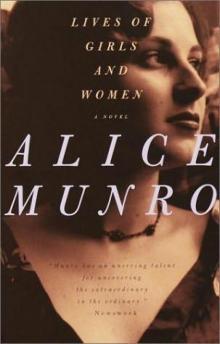 Lives of Girls and Women
Lives of Girls and Women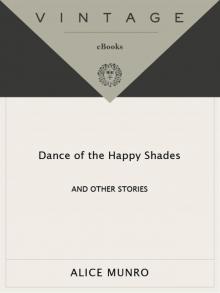 Dance of the Happy Shades
Dance of the Happy Shades Open Secrets
Open Secrets Julieta (Movie Tie-in Edition)
Julieta (Movie Tie-in Edition)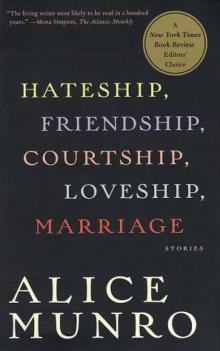 Hateship, Friendship, Courtship, Loveship, Marriage: Stories
Hateship, Friendship, Courtship, Loveship, Marriage: Stories Alice Munro's Best
Alice Munro's Best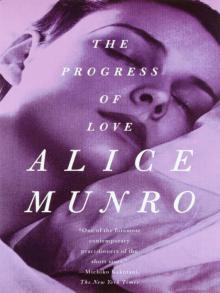 The Progress of Love
The Progress of Love Selected Stories
Selected Stories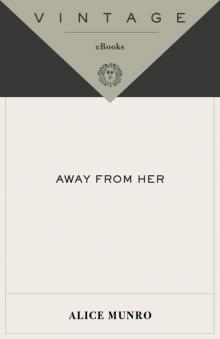 Away from Her
Away from Her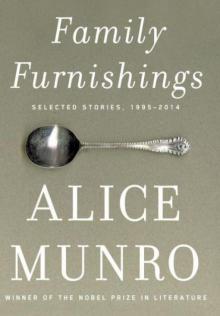 Family Furnishings
Family Furnishings Moons of Jupiter
Moons of Jupiter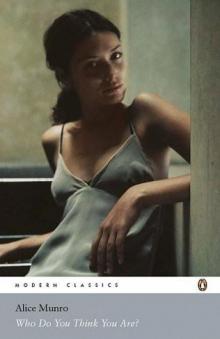 Who Do You Think You Are?
Who Do You Think You Are?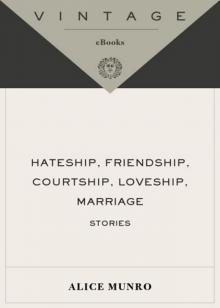 Hateship, Friendship, Courtship, Loveship, Marriage
Hateship, Friendship, Courtship, Loveship, Marriage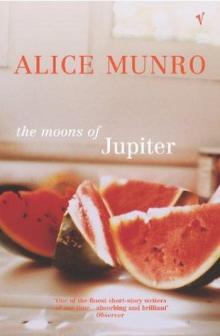 The Moons of Jupiter
The Moons of Jupiter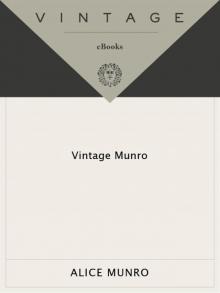 Vintage Munro
Vintage Munro The Love of a Good Woman
The Love of a Good Woman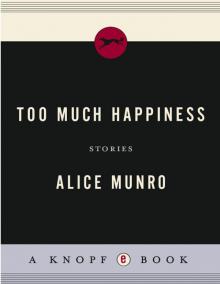 Too Much Happiness
Too Much Happiness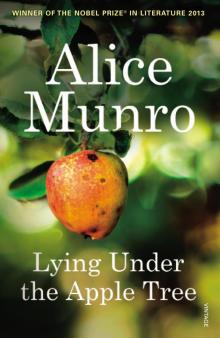 Lying Under the Apple Tree
Lying Under the Apple Tree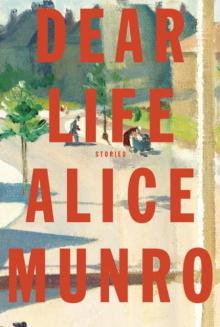 Dear Life
Dear Life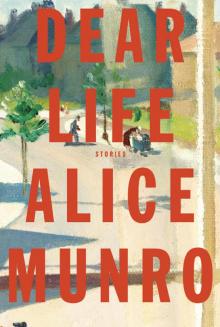 Dear Life: Stories
Dear Life: Stories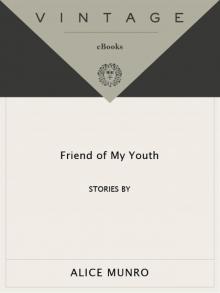 Friend of My Youth
Friend of My Youth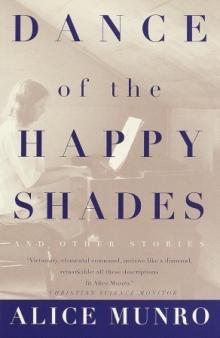 Dance of the Happy Shades: And Other Stories
Dance of the Happy Shades: And Other Stories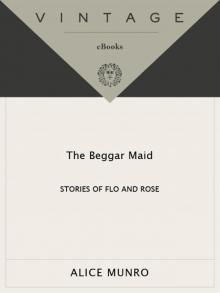 The Beggar Maid
The Beggar Maid